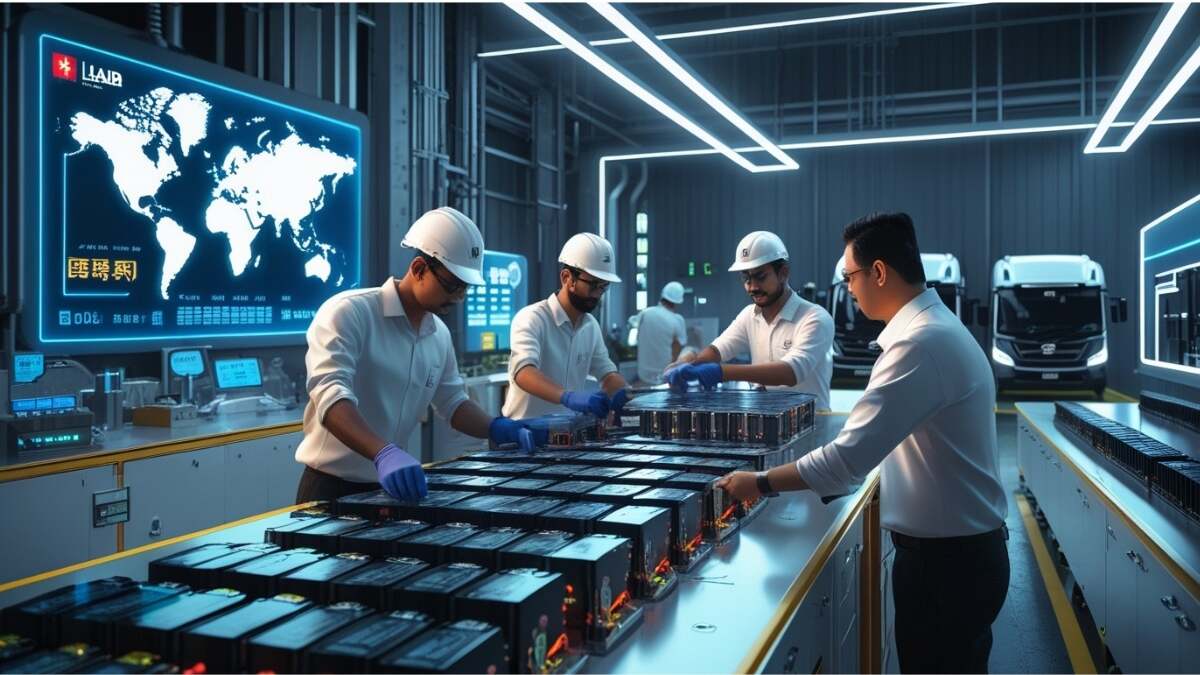Some of the biggest Indian conglomerates may use Ashok Leyland’s partnership with a Chinese cell manufacturer as a test case if it becomes effective.
The company Ashok Leyland Ltd., which is the flagship of the rich Hinduja family, is counting on CALB Group Co., the third-largest battery manufacturer in China, to support its goal of progressively gaining control of the technology underlying lithium-ion cells.
According to Shenu Agarwal, the CEO of Ashok Leyland, the country’s second-largest truck and bus manufacturer, which inked a 20-year contract with CALB earlier this month, would begin by buying cells from its Chinese partner and learning how to put them together in packs. He stated that the carmaker would progressively look to develop and produce lithium-ion batteries in the country.
Some of the biggest Indian conglomerates may use Ashok Leyland’s partnership with a Chinese cell manufacturer as a test case if it becomes effective. Businesses like the JSW Group and Reliance Industries Ltd. are also looking to collaborate with Chinese businesses on battery technology that is not available domestically.
While pushing for strategic self-reliance in key industries, India must use Chinese expertise to speed its green energy aspirations. Beijing has restricted the export of rare earth magnets and technology, but the current warming in bilateral relations has raised expectations for further commercial links.
According to Agarwal, “if 70% of the components originate from outside, we are not truly an EV player.” The company is also seeking to establish alliances with other businesses in order to fully understand the battery value chain.
The Chennai-based company intends to spend over 50 billion rupees ($563 million) over seven to ten years to produce next-generation batteries for everything from grids to automobiles as part of its partnership with CALB. One of the leading bus manufacturers in the world, Ashok Leyland, already imports battery packs from CALB.
According to BloombergNEF analyst Komal Kareer, “India is a particularly appealing location for investment from Chinese car and battery makers due to its sheer size and geographic closeness.” For Chinese businesses, India’s expanding energy storage industry and expanding EV market offer enormous potential, she said.
Consciously cautious
At first, CALB will provide the cells, and Ashok Leyland, under the direction of the Chinese business, will concentrate on gaining knowledge of pack assembly, including how to control the heat produced by the electrical components and include software into the design.
Agarwal said that the company’s strategy is purposefully conservative and that even top Chinese manufacturers continue to struggle with significant disparities in plant productivity. “In the beginning, process is even more crucial than technology,” he said.
According to Agarwal, the two businesses want to “do everything is authorized by the law of the nation” and have not yet specified every aspect of their collaboration.
BloombergNEF projects that by 2035, the South Asian country would have the third-largest battery market globally, with demand doubling 19 times.
Even to the Aug. 31 meeting between Chinese President Xi Jinping and Indian Prime Minister Narendra Modi, businesses in India had already started looking for collaborations with Chinese companies.
Billionaire Gautam Adani visited the Chinese facilities of Contemporary Amperex Technology Co., the largest battery manufacturer in the world, earlier this year in an attempt to discuss a possible battery production partnership with EV behemoth BYD. According to Bloomberg News’ July article, which cited individuals familiar with the situation, Tycoon Sajjan Jindal’s JSW Group has an arrangement with Chery Automobile Co. for electric car technology and components.
Assisting Function
Within two to three years, Ashok Leyland anticipates supplying battery packs for grid-scale storage as well as other manufacturers, including two- and three-wheelers, in addition to its own cars.
According to Agarwal, CALB will play a limited but helpful role in the company’s ambitions to establish an India-based research and development center that would concentrate on battery innovation, packaging, and materials science. The largest potential, in its opinion, is the rapidly expanding market for battery energy storage devices.
“The ultimate goal is to design and construct lithium-ion cells in India,” Agarwal said, adding that the company’s plan is to create capabilities and be ready when the market hits a tipping point. This milestone will take at least five years.
Phased learning, according to Ashok Leyland, would provide them a competitive edge over competitors that jumped into cell manufacture. “These days, batteries are a mystery. In India right now, nobody knows anything about batteries,” he stated. “A lot of patience is required with this technique.”

